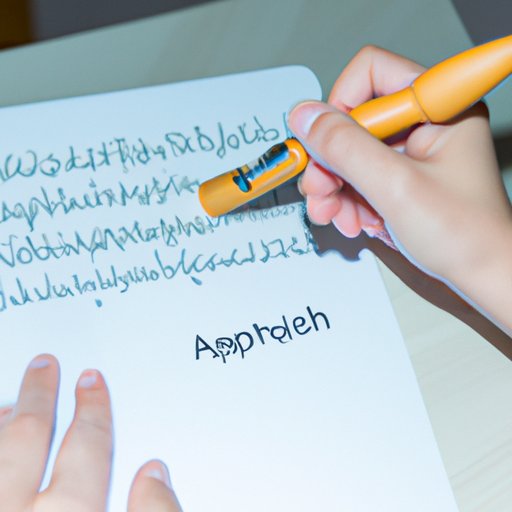Introduction
Aphasia is a neurological disorder that affects a person’s ability to communicate. It can impact a person’s ability to understand and produce language, as well as read and write. While the effects of aphasia on speaking and comprehension are often discussed, the effects it has on writing are less widely known. This article will explore the various ways in which aphasia can affect a person’s writing abilities, and provide strategies for overcoming these challenges.
Definition of Aphasia
Aphasia is a communication disorder that affects a person’s ability to comprehend, process, and express language. It can occur after stroke or traumatic brain injury, and is caused by damage to the areas of the brain responsible for language processing. The severity of aphasia can range from mild to severe, and can affect a person’s ability to understand both spoken and written language. People with aphasia may also have difficulty producing language, whether it be speaking or writing.
Overview of How Aphasia Impacts Writing
People with aphasia may have difficulty with all aspects of writing, including planning and organizing ideas, finding the right words, formulating sentences, and sequencing words and letters. In addition, people with aphasia may have difficulty understanding written language, such as stories, instructions, or directions. These difficulties can make it difficult for people with aphasia to participate in activities that require writing, such as taking notes in class, completing assignments, and writing emails.
Case Studies
Examining case studies of individuals with aphasia can provide insight into the challenges they face when attempting to write. One study examined the writing of a man with aphasia who was required to write an essay as part of a college course. The study found that he had difficulty expressing his ideas in writing due to a lack of available words and poor grammar. He also had difficulty organizing his thoughts and struggled to remember words he wanted to use. Despite these challenges, the man was able to complete the essay with assistance from a speech-language pathologist.
Another study examined the writing of a woman with aphasia who was asked to write a letter to her niece. The study found that she was able to organize her thoughts and plan out what she wanted to say in the letter. However, she had difficulty finding the right words and used incorrect grammar and syntax. With the help of a speech-language pathologist, she was able to improve her writing skills and successfully complete the letter.
Speech-Language Pathologists
Speech-language pathologists (SLPs) play an important role in helping people with aphasia improve their writing abilities. SLPs can help people with aphasia learn strategies for improving their writing, such as using visual cues to help them remember words and phrases, breaking down tasks into smaller steps, and using word banks to help them find the right words. SLPs can also provide support and guidance to help people with aphasia become more confident and independent writers.
Written Language Processing
Aphasia can also affect a person’s ability to process written language. People with aphasia may have difficulty understanding complex language structures, recognizing spelling patterns, or using correct grammar and syntax. To compensate for these deficits, people with aphasia may use strategies such as breaking down sentences into simpler components, rereading passages multiple times, and using sentence starters or word banks to help them write.
Technology
Technology can also be used to help people with aphasia improve their writing skills. Assistive devices such as voice recognition software, text-to-speech programs, and predictive text applications can help people with aphasia write more efficiently and accurately. In addition, adaptive technology such as word prediction and vocabulary banks can help people with aphasia find the right words quickly and easily.
Conclusion
In conclusion, aphasia can have a significant impact on a person’s ability to write. People with aphasia may experience difficulty understanding written language, formulating sentences, and using correct grammar and syntax. Working with a speech-language pathologist can help people with aphasia improve their writing skills, and assistive technology can help them write more efficiently and accurately. By understanding the challenges associated with writing and exploring strategies for overcoming them, people with aphasia can become successful and confident writers.
Summary of Findings
This article explored the various ways in which aphasia can affect a person’s writing abilities, including difficulty understanding and producing language, poor grammar and syntax, and difficulty organizing thoughts. Case studies were examined to gain insight into the challenges faced by people with aphasia when writing. The role of speech-language pathologists in assisting people with aphasia was discussed, as well as the effects of aphasia on written language processing and the use of technology to enhance writing. Finally, recommendations for people living with aphasia were provided.

Recommendations for People Living With Aphasia
People living with aphasia can take the following steps to improve their writing skills:
- Work with a speech-language pathologist to learn strategies for improving writing.
- Use assistive technology such as voice recognition software and text-to-speech programs to write more efficiently and accurately.
- Break down writing tasks into smaller, manageable steps.
- Use visual cues, word banks, and sentence starters to help find the right words.
(Note: Is this article not meeting your expectations? Do you have knowledge or insights to share? Unlock new opportunities and expand your reach by joining our authors team. Click Registration to join us and share your expertise with our readers.)
